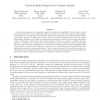69 search results - page 4 / 14 » Compressed Inverted Indexes for In-Memory Search Engines |
SIGIR
2011
ACM
12 years 10 months ago
2011
ACM
Large search engines process thousands of queries per second over billions of documents, making query processing a major performance bottleneck. An important class of optimization...
VLDB
1993
ACM
13 years 11 months ago
1993
ACM
There are many advantages to be gained by storing the lexicon of a full text database in main memory. In this paper we describe how to use a compressed inverted file index to sear...
WWW
2007
ACM
14 years 8 months ago
2007
ACM
Recent work on incremental crawling has enabled the indexed document collection of a search engine to be more synchronized with the changing World Wide Web. However, this synchron...
IPPS
2007
IEEE
14 years 1 months ago
2007
IEEE
We study efficient query processing in distributed web search engines with global index organization. The main performance bottleneck in this case is due to the large amount of i...
IM
2007
13 years 7 months ago
2007
Today’s search engines are increasingly required to broaden their capabilities beyond free-text search. More complex features, such as supporting range constraints over numeric ...

